

Scribe Publications, paperback, 9781921215964
Set in Sydney, Australia, Indelible Ink tells the story of Marie and her three adult children. Marie is newly divorced and, having lost money in the settlement, has been forced to put her house on the market. For many years she has lived on a harbourside property, raising her children and establishing a marvellous garden. Although Marie is sad to be leaving, she finds herself becoming emotionally detached from her friends and lifestyle in the affluent suburb of Mosman. Until the house is sold she is in limbo and of course she wonders about her future.
Wandering the city one day, after too many drinks, Marie finds a tattoo parlour and has her ankle decorated:
Tattoos are absolutely non de rigueur for a woman of Marie's social status, and her family and friends react with criticism and a sense of mild disgust. Nevertheless Marie, now sober, throws herself into the new pleasure of being tattooed regularly. The tattoo parlour is in a different, more bohemian, part of Sydney. Marie relishes the cultural change and forms a friendship with Rhys, her female tattooist.
Apart from their interaction with Marie, her children—Clark, Leo and Blanche—are facing their own dilemmas. Clark is in his forties, almost broke and in a relationship with a married woman. Leo is a horticulturist, is gay, and is unsettled. My favourite character was Blanche—working in advertising, buying real estate and always doubtful of her abilities. When she becomes pregnant Blanche is tormented by the choices which face her. Both termination and motherhood appear equally terrifying.
Indelible Ink is like a time capsule. Topical references abound including the recent global financial crisis as it affects these Sydneysiders. Mostly, though, this is a very Australian novel. Marie's garden is being affected by the ten-year drought—water restrictions prevent her from maintaining the garden as she would like. Australian brand names, television shows, events and public figures are dotted throughout the story. I'm delighted that MacGregor has made this book unashamedly Australian and not more generic. Marie's geographical milieu includes: Mosman (location of my favourite bookshop); Surry Hills (I used to work there); Missenden Road (I used to live there); and Paddington (more good bookshops). You don't need to be Australian to enjoy this novel, but I was chuffed to visit these places I know.
Although I enjoyed Indelible Ink very much, I felt that MacGregor's characters were not fully realised. Blanche was probably the most substantial but I regretted that I could not feel closer to Marie. For me there was not enough depth to this main character. MacGregor has delivered a well-written story about family and home, two things which leave a lasting imprint and which bind people to each other. Despite my misgivings about the characters I was happy to read Indelible Ink. Aside from an engaging plot this novel is worthy of note because it is uniquely Australian.
